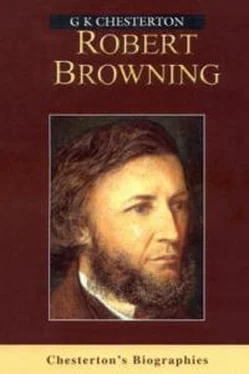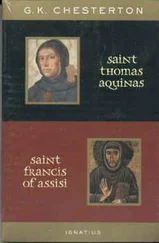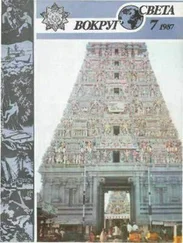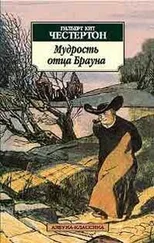Гилберт Честертон - Robert Browning
Здесь есть возможность читать онлайн «Гилберт Честертон - Robert Browning» весь текст электронной книги совершенно бесплатно (целиком полную версию без сокращений). В некоторых случаях можно слушать аудио, скачать через торрент в формате fb2 и присутствует краткое содержание. Год выпуска: 2014, Издательство: epubBooks Classics, Жанр: Биографии и Мемуары, на английском языке. Описание произведения, (предисловие) а так же отзывы посетителей доступны на портале библиотеки ЛибКат.
- Название:Robert Browning
- Автор:
- Издательство:epubBooks Classics
- Жанр:
- Год:2014
- ISBN:нет данных
- Рейтинг книги:5 / 5. Голосов: 1
-
Избранное:Добавить в избранное
- Отзывы:
-
Ваша оценка:
- 100
- 1
- 2
- 3
- 4
- 5
Robert Browning: краткое содержание, описание и аннотация
Предлагаем к чтению аннотацию, описание, краткое содержание или предисловие (зависит от того, что написал сам автор книги «Robert Browning»). Если вы не нашли необходимую информацию о книге — напишите в комментариях, мы постараемся отыскать её.
Robert Browning — читать онлайн бесплатно полную книгу (весь текст) целиком
Ниже представлен текст книги, разбитый по страницам. Система сохранения места последней прочитанной страницы, позволяет с удобством читать онлайн бесплатно книгу «Robert Browning», без необходимости каждый раз заново искать на чём Вы остановились. Поставьте закладку, и сможете в любой момент перейти на страницу, на которой закончили чтение.
Интервал:
Закладка:
It is not by any means self–evident upon the face of it that an institution like the liberty of speech is right or just. It is not natural or obvious to let a man utter follies and abominations which you believe to be bad for mankind any more than it is natural or obvious to let a man dig up a part of the public road, or infect half a town with typhoid fever. The theory of free speech, that truth is so much larger and stranger and more many–sided than we know of, that it is very much better at all costs to hear every one's account of it, is a theory which has been justified upon the whole by experiment, but which remains a very daring and even a very surprising theory. It is really one of the great discoveries of the modern time; but, once admitted, it is a principle that does not merely affect politics, but philosophy, ethics, and finally poetry.
Browning was upon the whole the first poet to apply the principle to poetry. He perceived that if we wish to tell the truth about a human drama, we must not tell it merely like a melodrama, in which the villain is villainous and the comic man is comic. He saw that the truth had not been told until he had seen in the villain the pure and disinterested gentleman that most villains firmly believe themselves to be, or until he had taken the comic man as seriously as it is the custom of comic men to take themselves. And in this Browning is beyond all question the founder of the most modern school of poetry. Everything that was profound, everything, indeed, that was tolerable in the aesthetes of 1880, and the decadent of 1890, has its ultimate source in Browning's great conception that every one's point of view is interesting, even if it be a jaundiced or a blood–shot point of view. He is at one with the decadents, in holding that it is emphatically profitable, that it is emphatically creditable, to know something of the grounds of the happiness of a thoroughly bad man. Since his time we have indeed been somewhat over–satisfied with the moods of the burglar, and the pensive lyrics of the receiver of stolen goods. But Browning, united with the decadents on this point, of the value of every human testimony, is divided from them sharply and by a chasm in another equally important point. He held that it is necessary to listen to all sides of a question in order to discover the truth of it. But he held that there was a truth to discover. He held that justice was a mystery, but not, like the decadents, that justice was a delusion. He held, in other words, the true Browning doctrine, that in a dispute every one was to a certain extent right; not the decadent doctrine that in so mad a place as the world, every one must be by the nature of things wrong.
Browning's conception of the Universe can hardly be better expressed than in the old and pregnant fable about the five blind men who went to visit an elephant. One of them seized its trunk, and asserted that an elephant was a kind of serpent; another embraced its leg, and was ready to die for the belief that an elephant was a kind of tree. In the same way to the man who leaned against its side it was a wall; to the man who had hold of its tail a rope, and to the man who ran upon its tusk a particularly unpleasant kind of spear. This, as I have said, is the whole theology and philosophy of Browning. But he differs from the psychological decadents and impressionists in this important point, that he thinks that although the blind men found out very little about the elephant, the elephant was an elephant, and was there all the time. The blind men formed mistaken theories because an elephant is a thing with a very curious shape. And Browning firmly believed that the Universe was a thing with a very curious shape indeed. No blind poet could even imagine an elephant without experience, and no man, however great and wise, could dream of God and not die. But there is a vital distinction between the mystical view of Browning, that the blind men are misled because there is so much for them to learn, and the purely impressionist and agnostic view of the modern poet, that the blind men were misled because there was nothing for them to learn. To the impressionist artist of our time we are not blind men groping after an elephant and naming it a tree or a serpent. We are maniacs, isolated in separate cells, and dreaming of trees and serpents without reason and without result.
Chapter VIII
The Philosophy of Browning
The great fault of most of the appreciation of Browning lies in the fact that it conceives the moral and artistic value of his work to lie in what is called "the message of Browning," or "the teaching of Browning," or, in other words, in the mere opinions of Browning. Now Browning had opinions, just as he had a dress–suit or a vote for Parliament. He did not hesitate to express these opinions any more than he would have hesitated to fire off a gun, or open an umbrella, if he had possessed those articles, and realised their value. For example, he had, as his students and eulogists have constantly stated, certain definite opinions about the spiritual function of love, or the intellectual basis of Christianity. Those opinions were very striking and very solid, as everything was which came out of Browning's mind. His two great theories of the universe may be expressed in two comparatively parallel phrases. The first was what may be called the hope which lies in the imperfection of man. The characteristic poem of "Old Pictures in Florence" expresses very quaintly and beautifully the idea that some hope may always be based on deficiency itself; in other words, that in so far as man is a one–legged or a one–eyed creature, there is something about his appearance which indicates that he should have another leg and another eye. The poem suggests admirably that such a sense of incompleteness may easily be a great advance upon a sense of completeness, that the part may easily and obviously be greater than the whole. And from this Browning draws, as he is fully justified in drawing, a definite hope for immortality and the larger scale of life. For nothing is more certain than that though this world is the only world that we have known, or of which we could even dream, the fact does remain that we have named it "a strange world." In other words, we have certainly felt that this world did not explain itself, that something in its complete and patent picture has been omitted. And Browning was right in saying that in a cosmos where incompleteness implies completeness, life implies immortality. This then was the first of the doctrines or opinions of Browning: the hope that lies in the imperfection of man. The second of the great Browning doctrines requires some audacity to express. It can only be properly stated as the hope that lies in the imperfection of God. That is to say, that Browning held that sorrow and self–denial, if they were the burdens of man, were also his privileges. He held that these stubborn sorrows and obscure valours might, to use a yet more strange expression, have provoked the envy of the Almighty. If man has self–sacrifice and God has none, then man has in the Universe a secret and blasphemous superiority. And this tremendous story of a Divine jealousy Browning reads into the story of the Crucifixion. If the Creator had not been crucified He would not have been as great as thousands of wretched fanatics among His own creatures. It is needless to insist upon this point; any one who wishes to read it splendidly expressed need only be referred to "Saul." But these are emphatically the two main doctrines or opinions of Browning which I have ventured to characterise roughly as the hope in the imperfection of man, and more boldly as the hope in the imperfection of God. They are great thoughts, thoughts written by a great man, and they raise noble and beautiful doubts on behalf of faith which the human spirit will never answer or exhaust. But about them in connection with Browning there nevertheless remains something to be added.
Читать дальшеИнтервал:
Закладка:
Похожие книги на «Robert Browning»
Представляем Вашему вниманию похожие книги на «Robert Browning» списком для выбора. Мы отобрали схожую по названию и смыслу литературу в надежде предоставить читателям больше вариантов отыскать новые, интересные, ещё непрочитанные произведения.
Обсуждение, отзывы о книге «Robert Browning» и просто собственные мнения читателей. Оставьте ваши комментарии, напишите, что Вы думаете о произведении, его смысле или главных героях. Укажите что конкретно понравилось, а что нет, и почему Вы так считаете.










